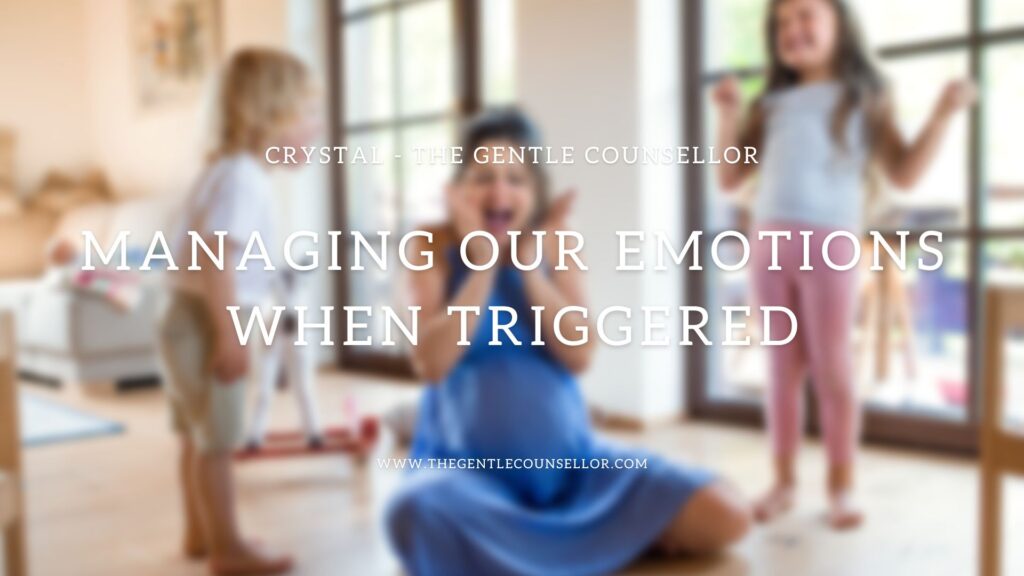
Entering parenthood means stepping into so many unknowns. Everyone warns you that it will be hard but also the best thing ever. But no one really talks openly about how often you will be triggered as a parent and how we can begin managing emotions when triggered. Especially while we as parents work to heal our own pre-existing trauma! We are here as cycle breakers wanting to do better for our kids! So how can you stay calm when you feel that frustration or anger start to bubble?
Let’s start by talking about what is actually going on. To do that we need to understand a dysregulated nervous system. Think of it like the flight, fright, freeze response is there to keep us safe. It kept us safe in caveman days. Our brain has been biologically programmed to respond to an unsafe situation and keep us safe. However, when we are triggered and those feelings start bubbling up our brain doesn’t know the difference and that this moment is safe. It doesn’t know that there are no sabre-toothed tigers prowling around you anymore.
What is Actually Happening When We Get Triggered?
When we are triggered we are actually responding based on old feelings, trauma and patterns. We revert to habitual behaviour that was normalised within past environments and by role models. Most commonly this emotion then presents physically based upon that pre-existing pattern. Maybe as a tight chest, sad crying, anger, yelling, making threats, aggressive body language, or smacking. As a parent trying to do better – trying to build new cycles as a gentle parent – it is devasting when you realise you slipped back into old patterns because you were triggered.
The first step to managing emotions when triggered is to recognise these patterns and behaviours. Sit with the triggers and ask yourself what is sitting there. Were your parents able to be with you in your emotions? For many of us – emotions like joy were fine but emotions like anger, sadness, fear or shame were shut down. How had that impacted you now as an adult? It is never too late to start parenting differently! And it starts with reparenting ourselves and working towards healing those inner wounds.
Here is the thing though – kids’ behaviour is still going to trigger you. Even with knowing the developmental facts. You will still be triggered even knowing their behaviour is 100% normal and appropriate for their age. And even with working on our own trauma and triggers. You are still going to have moments when you have to be able to manage those bubbling emotions. So what then?
Take a Breath
Before anything else, you need to calm yourself down first. A dysregulated parent can not possibly help a dysregulated child regulate!

You need to be calm enough to be the rock that weathers their storm and helps them calm down too. Managing emotions is tricky – you can’t help them until you can model that calmness also. Start by taking a deep breath and making sure that your child/ren is safe (eg baby is in the cot, the toddler is in a safe room etc) and recognise that if you don’t take a moment you could do more harm by staying with them if you start yelling or smacking.
Then take 5 minutes alone if possible. Go to your bedroom, go outside or hide in your bathroom if needed. If at all possible – take those few minutes alone to calm down. Use these minutes to regulate yourself.
Strategies to Regulate
- Try deep breathing
- EFT tapping
- shaking your hands/arms/body
- splash cold water on your face or have a shower,
- call a friend to vent
- cry/scream into a pillow
Then, only once you are calm enough, take a moment to consider if you need to apologise or repair a rupture in the relationship. How do you want or need to approach this situation and help your child now regulate? Remember that the same strategies that you used in managing emotions and regulating can be used to help your child now regulate too.
There will be plenty of these moments where we are triggered as parents. But there are things that we can do to reduce them! HALT is a fantastic mental checklist!
- H – am I hungry?
- A – am I already angry?
- L – am I feeling lonely?
- T – am I tired?
Basically, ask yourself if you are practising true self-care. Are there any unmet needs right now?
Being a parent is not easy – especially as a cycle breaker! There are NO perfect parents! As much as social media might try to tell you otherwise – the perfect parent does not exist! There is also no shame in needing help. You do not need to do this alone. If you are still struggling or if you need someone to talk to I am here to help. You can check my emotional regulation guide ebook or book a time with me where we can work through your triggers in a safe place. I see you every step of the way.
Book a Counselling session here.